

I've gotten overly excited in sales rep interviews and made some bad hires. I felt pressured to move quickly, and the sales rep answered my questions perfectly.
My problem? I relied on the answer to a single question instead of finding the patterns of success.
In today's issue, I will teach you how to identify the patterns that align with the qualities of top salespeople.
Sales reps are great interviewers. You need an interview method that pulls out patterns. Here's a refresher on my recommended interview method.
Many people have their top 30 interview questions, and salespeople are ready for them. Any decent sales rep will ace these every time.
When you identify the top qualities in your candidates, you'll get:
Here's the patterns that represent each trait:
When assessing grit, dive into the details of the low points in each role. What changes did they make to improve the low points?
You want to see from each job if they could break the pattern of low points from the previous positions.
Example
Manager: "What were some of the low points you had in that postion?"
Candidate: "I had a very slow start and was put on a PIP plan in my first year."
Manager: "How did you pull out of it?"
Candidate: "I role-played with my peers after work hours and read as many sales books as possible. In a year, I was in the top 5 for new sales."
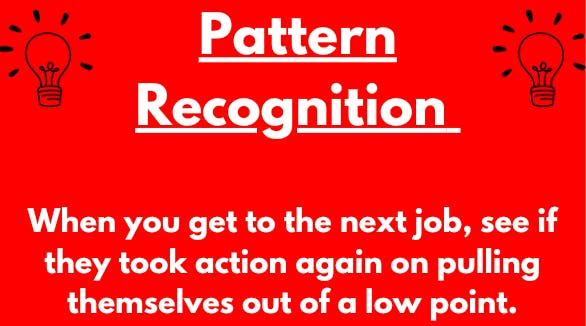
When assessing assertiveness, you want to get into the specifics of a couple of deals they are most proud of. Get to the root of what they felt they did differently from everyone else to land those deals.
Example
Manager: "What accomplishments were you most proud of in that role?"
Candidate: "I was able to close Walmart, and it was a huge deal for the company."
Manager: "Walk me through the deal..."
Candidate: "I tried to break through for a long time and couldn't get anywhere, so I changed my method completely. I knew they were struggling in a particular area. So, I did my research and brought them a new way of tackling the problem. I told them I was confident they hadn't looked at it from this angle. At the very least, they would walk away with a different view of the problem. With a few weeks of persistence, they scheduled the intro call, and 12 months later, they became a customer."
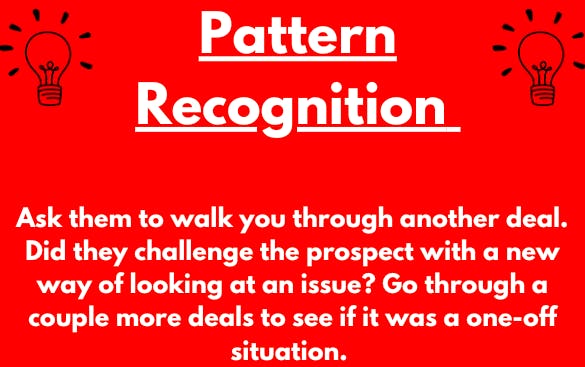
For coachability, you'll dive into what working with their boss in each role was like. You'll find out pretty quickly if they want the support that was offered.
Example - Great Boss at Job #1
Manager: "What was it like working with Sarah?"
Candidate: "I loved working with Sarah. She taught me more than any boss I've had. She was great at breaking down something challenging and helping me improve."
Example - Bad Boss at Job #2
Manager: "What was it like working with Tom?"
Candidate: "I liked Tom, but I was often left alone to figure things out."
Manager: "How did you improve on your own?"
Candidate: "I asked my peers to listen to some of my calls to see if they noticed any areas where I could improve. I also joined a group of sales reps outside of the company. We share what's working well for us and where we're struggling."
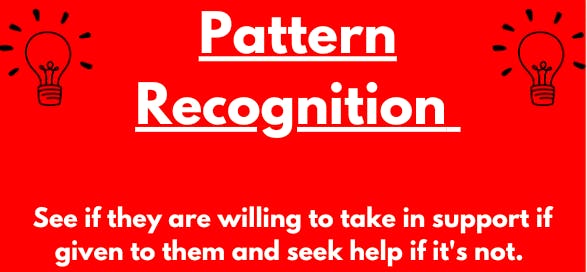
You'll assess curiosity by looking into what they did on their own to learn about their customers.
Example
Manager: "What accomplishments were you most proud of?"
Candidate: "I made it to number 1 on the team out of 30 sales reps."
Manager: "How did you do that?"
Candidate: "I focused on the customer and really took an interest in their business."
Manager: "Do you have some examples of what you did to learn about the customer?"
Candidate: "My favorite thing to do was sit on the speaking sessions at conferences I attended. When we had downtime, I'd listen to the talks and learn a ton about my customers' challenges. This built a ton of trust with my prospects as I could pass along helpful information whether they went with our product or not."
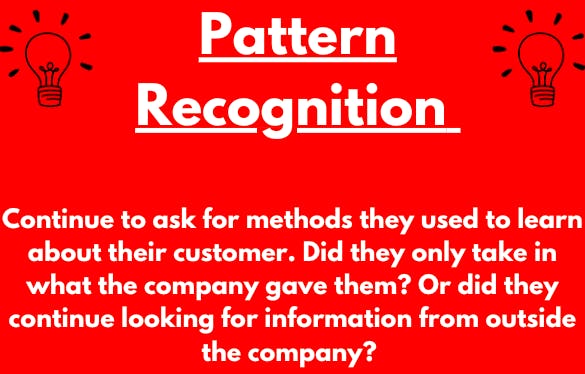
A growth mindset is one of the easiest and also one of the most important to spot. Simply put, what did they do to improve their weaknesses?
Example at Job #1:
Manager: "What will Steve (their boss) tell me were your biggest areas for improvement?"
Candidate: "Steve will say that I need to improve my organizational skills."
Example at Job #2:
Manager: "What will Mary (their boss) say were your biggest strengths?
Candidate: "Definitely building relationships and organizing my day."
Manager: "How did you improve your organization from Job 1 to Job 2?"
Candidate: "I realized that my organizational skills were hurting my productivity. So, I worked with Mary to set up my daily schedule better. I started using time blocks to stay organized, and it helped me stay focused."
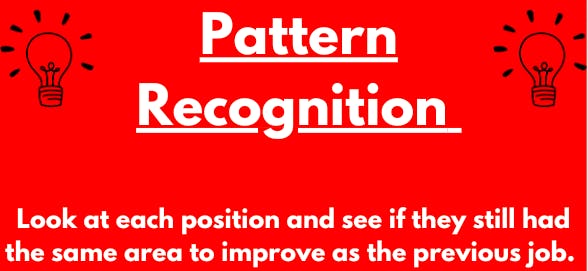
By using this strategy, you'll start recognizing the patterns that matter. These patterns will allow you to detach from how a candidate answers any one question. As a result, you'll bring on a high-quality team and will move faster through the hiring process.
